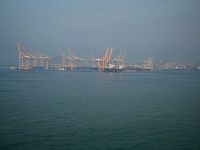Dr. Gil Feiler
The Gulf Cooperation Council (GCC), comprising Saudi Arabia, United Arab Emirates, Kuwait, Qatar, Oman, and Bahrain, stands at the forefront of global oil production and exportation. Oil has long been the backbone of these economies, significantly contributing to their GDPs and government revenues. As the world transitions towards renewable energy sources, understanding the expected oil prices in this region is crucial.
Over the past decade, oil prices have oscillated significantly, mainly due to geopolitical tensions, OPEC’s production strategies, and market demand influenced by the global economy and the COVID-19 pandemic. For instance, following a peak in mid-2014 when Brent crude reached approximately $115 per barrel, prices plummeted to below $30 in early 2016 due to oversupply and weakening demand.
The resurgence of prices in 2018 marked a brief period of stability, but the onset of the COVID-19 pandemic in 2020 led to a drastic decline as global demand plummeted. Following the pandemic, a recovery began, with prices gradually increasing in response to revived economic activity and supply chain disruptions. This recent history illustrates the volatility of oil prices and the multifaceted elements that contribute to fluctuations.
As of 2023, the oil market is experiencing a recovery phase, with demand rebounding in many sectors. The International Energy Agency (IEA) forecasts that global oil demand will return to pre-pandemic levels as economies continue to recover. This resurgence is driven largely by increased consumption in emerging economies and the transportation sector, which are still vying for oil as a primary energy source.
The GCC countries, particularly Saudi Arabia and the UAE, have adapted their production levels in response to global market dynamics. The OPEC+ alliance, which includes these countries, has played a pivotal role in stabilizing prices by implementing production cuts. As we look towards the end of 2025, it's crucial to understand the factors influencing both actual production and market perception concerning GCC oil.
Factors Influencing Oil Prices
1. Geopolitical Factors: The geopolitical landscape significantly influences oil prices. Tensions in the Middle East, including conflicts in Yemen and Iraq, as well as Iran's nuclear ambitions, can lead to supply disruptions. Furthermore, OPEC's ability to manage production effectively can substantially affect oil prices. The likelihood of cooperation within the OPEC+ framework can lead to a more stable price environment.
2. Economic Factors: Global economic growth is inherently linked to oil demand. Following economic contractions caused by the pandemic, the recovery trajectory is crucial. Should global growth continue to trend upwards, we may witness increased oil consumption, pushing prices higher. In contrast, economic slowdowns resulting from inflationary pressures or other global crises would negatively impact oil demand and prices.
3. Technological Advances: Technological innovation, particularly in extraction and drilling methods, can decrease production costs and increase the supply of oil, thereby influencing prices. Additionally, as more countries invest in renewable energy technologies, the long-term demand for oil may decline, raising concerns over the sustainability of current price levels.
4. Environmental and Regulatory Factors: Growing environmental awareness and regulatory pressures are reshaping the oil landscape. The Paris Agreement and subsequent pledges by countries to reduce carbon emissions may directly impact oil demand. GCC nations are increasingly aware of the need to diversify their economies and invest in renewable energy sources, which could alter their long-term oil production strategies.
Forecasting Oil Price Scenarios for 2025
Conservative Estimate: Given the current data and projected economic recovery, a conservative estimate would put GCC oil prices at around $70-$80 per barrel by the end of 2025. This assumes steady demand growth balanced by OPEC+ production controls and a stable geopolitical environment. Global economic conditions are expected to gradually improve, contributing to increased oil consumption.
Optimistic Estimate: An optimistic scenario may see prices soar to between $85 and $95 per barrel if geopolitical tensions escalate or if OPEC+ decides to limit production further to support prices amid rising demands. Additionally, if global economic recovery exceeds expectations and the balance between supply and demand tightens, prices could reach these elevated levels.
Pessimistic Estimate: Conversely, a pessimistic outlook driven by a potential global recession or rapid advancements in renewable energy technologies could lead to downward pressure on prices, putting them at approximately $50-$60 per barrel. This scenario considers reduced global demand as economies shift towards sustainable energy sources and the impact of possible oversupply in the oil market.










